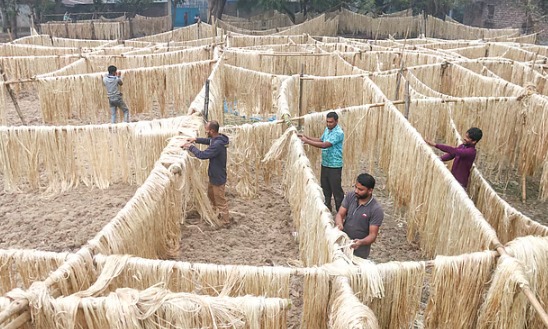Desk report,
Government maintains previous tariff on jute exports
The government has brought back the fee (fee) for the export of raw jute and jute products to its previous level. The government will now charge 2 taka for each bale of raw jute export as before. And it will charge 10 paisa against the export price of every 100 taka of jute products.
Government maintains previous tariff on jute exports
After 30 years, in April, through a notification, the government had fixed a fee of 7 taka for each bale of raw jute export and 50 paisa against the export price of every 100 taka of jute products. Recently, the government has reversed that decision and fixed the government fee as before. The Ministry of Jute and Textiles issued this notification. Earlier, cash assistance was reduced in this sector from the first day of the 2024-25 fiscal year, i.e. from July 1 last year. At that time, the government reduced cash assistance from 15 percent to 10 percent for the export of diversified jute products. In addition, cash assistance has been reduced from 7 to 5 percent for jute products and from 5 to 3 percent for jute yarn.
Meanwhile, the export of jute products is also decreasing year by year. According to the Export Promotion Bureau (EPB), goods worth 112.76 billion US dollars were exported in the fiscal year 2021-22. In the fiscal year 2022-23, it decreased to 91.15 billion US dollars. In the fiscal year 2023-24, exports decreased further to 85.52 billion US dollars.
According to the Jute Department, 13.44 million bales of raw jute were exported from Bangladesh to 13 countries including India, Pakistan, Nepal, and China in the fiscal year 2023-24. Raw jute worth 1,731 billion taka or 164.87 million US dollars was exported in that fiscal year. Of the total export earnings, more than 90 million dollars came from India.
The government has brought back the fee (fee) for the export of raw jute and jute products to its previous level. The government will now charge 2 taka for each bale of raw jute export as before. And it will charge 10 paisa against the export price of every 100 taka of jute products.
After 30 years, in April, through a notification, the government had fixed a fee of 7 taka for each bale of raw jute export and 50 paisa against the export price of every 100 taka of jute products. Recently, the government has reversed that decision and fixed the government fee as before. The Ministry of Jute and Textiles issued this notification. Earlier, cash assistance was reduced in this sector from the first day of the 2024-25 fiscal year, i.e. from July 1 last year. At that time, the government reduced cash assistance from 15 percent to 10 percent for the export of diversified jute products. In addition, cash assistance has been reduced from 7 to 5 percent for jute products and from 5 to 3 percent for jute yarn.
Meanwhile, the export of jute products is also decreasing year by year. According to the Export Promotion Bureau (EPB), goods worth 112.76 billion US dollars were exported in the fiscal year 2021-22. In the fiscal year 2022-23, it decreased to 91.15 billion US dollars. In the fiscal year 2023-24, exports decreased further to 85.52 billion US dollars.
According to the Jute Department, 13.44 million bales of raw jute were exported from Bangladesh to 13 countries including India, Pakistan, Nepal, and China in the fiscal year 2023-24. Raw jute worth 1,731 billion taka or 164.87 million US dollars was exported in that fiscal year. Of the total export earnings, more than 90 million dollars came from India.




